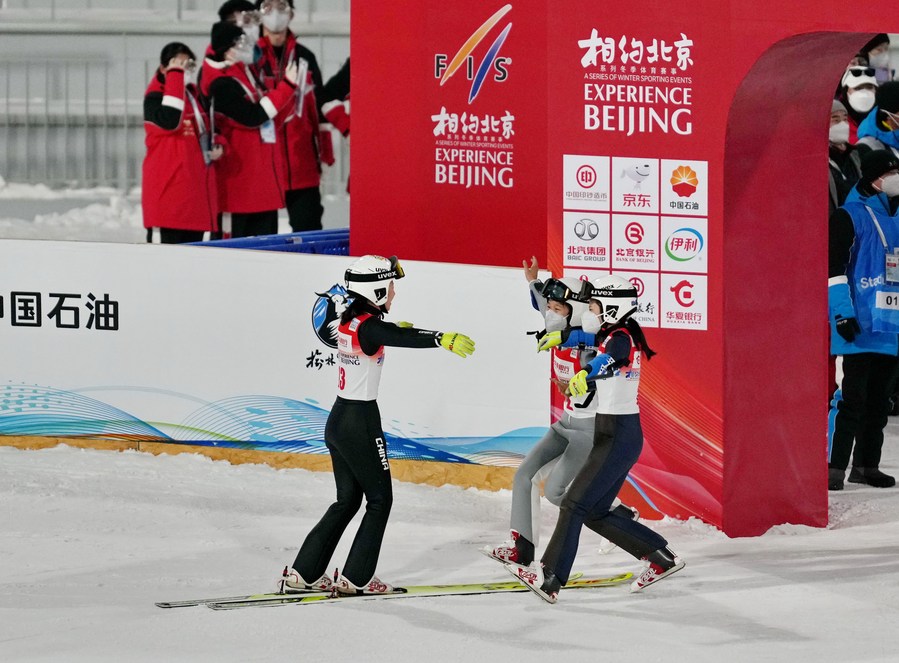Ski jumpers' Olympic hopes soar
 0 Comment(s)
0 Comment(s) Print
Print E-mail China Daily, December 27, 2021
E-mail China Daily, December 27, 2021

As a former hurdler who idolized track and field star Su Bingtian, Song Qiwu has taken his pursuit of speed onto the snow and into the air in one of the most thrilling of winter sports.
The 20-year-old Sichuan native, who had never even touched real snow before 2018, has defied the odds to become a winter Olympian ready to compete at his home Games in the daunting, gravity-defying sport of ski jumping.
As one of three Chinese ski jumpers to have qualified for the Beijing 2022 Winter Games, Song's target has been the same as his hero Su to spearhead China's rise in a Western-dominated sport on the Olympic stage.
"Hopefully I can produce my best performance at the Beijing Winter Olympics, a once-in-a-lifetime opportunity for most athletes, just like what Su did with his feat," Song said of the sprinter's historic appearance in the men's 100m final at the Tokyo Summer Olympics.
"My goal is to soar to the world's highest level in the sport, and I've drawn enough motivation from Su to do it," added Song, who earned his spot at Beijing 2022 by securing enough ranking points from a series of International Ski Federation Cup-level events.
With only one woman, Chang Xinyue, qualified for the 2018 Games in South Korea, China's national ski jumping program has been drafting athletes from other sports, such as track and field, gymnastics and taekwondo, to deepen its talent pool.
A full-time men's 110m hurdler until December 2018, Song's progression from literally knowing nothing about skiing-hailing from warm Sichuan province-to competing in the top-flight World Cup series over the course of just three years has underlined the host's ambition to expand its athletic prowess into niche winter sports.
The combination of foreign expertise and high-tech training facilities proved a game-changer for Song and his peers to catch up with the world's elite sooner than expected, said team manager Xu Gaohang.
"We are on the brink of major breakthroughs in ski jumping, having three athletes qualified for Beijing 2022 and we're still going after a qualification spot in the team event," Xu said during an online interview last week.
"Unfortunately, most of our athletes only got to compete internationally for the first time at the beginning of the Olympic season, due to the long break caused by the COVID-19 pandemic.
"But they still got used to the elite-level tests very quickly and have shown their rapid progress facilitated by the modern training support."
High-tech base
Helping Chinese ski jumpers fly further is a new training base in Laiyuan, Hebei province, which features two jumping hills and a wind tunnel lab.
As the country's first purpose-built wind tunnel for ski jumping performance evaluation, the Laiyuan lab is the world's biggest of its kind, generating wind gusts as fast as 50 meters per second-stronger than a typical hurricane-in three directions.
The speed and intensity of the air flow meet the requirements of all winter sports that are scored by speed, time and distance.
The tunnel is particularly helpful for ski jumpers, who need to adjust their takeoff angle, air posture and outfits to maximize aerodynamic performance.
"The biggest advantage of training in the tunnel is that we can instantly feel the differences of various body postures against the flow and adjust accordingly," said Song, who set a national men's record of 141.5 meters from a training jump off the large hill at the Laiyuan base in January.
"Training at the wind tunnel for three minutes, you can do the amount of repetitions that would take days on an actual hill. It's quite efficient and saves a lot of time," Song added.
China's men's ski jumpers have returned to the Laiyuan base for their final training camp before the Games open on Feb 4, while the women's team is training in Slovenia for its final World Cup leg at Ljubno (Dec 30-Jan 1).
Following in the footsteps of the retired Chang, who finished 20th at the 2018 Olympics, veteran Dong Bing and teenager Peng Qingyue are hoping to land further breakthroughs in women's normal hill, the only individual female ski jumping discipline at the Olympics.
"What I did four years ago was impressive at the time, but I believe with a greater foundation already laid in training support, the younger generation can achieve much better results," said Chang.
At the FIS Continental Cup at the newly built National Ski Jumping Center in Beijing 2022 co-host Zhangjiakou, Hebei province, Dong, 25, finished second, while Peng, 16, finished fourth among 16 final skiers on Dec 5, drawing international attention to the rise of Chinese athletes in a sport long dominated by Scandinavians.
Clas Brede Braathen, the head of the Norwegian Ski Jumping Federation, reckons it's only a matter of time before China tops the podium at elite-level events.
"Some of them have more than enough physical potential to become world number one," the former world championship silver medalist told Olympics.com after watching Chinese athletes train in Norway.
"We believe in them. I am convinced that they can become Olympic athletes and, more importantly, that a ski jumping culture can be developed for people in China. That would be fantastic."
Ski jumping has been a key fixture of the Winter Olympics ever since making its debut at the inaugural Winter Games in 1924 at Chamonix, France.
The sport has produced numerous iconic Olympic moments through the years-from plucky British underdog Eddie 'The Eagle' Edwards soaring through the air at Calgary 1988 to current Norwegian great Robert Johansson, dubbed the "Flying Moustache", ski jumping always seems to deliver something special at the Games.
"I think the Beijing 2022 Winter Olympics will introduce the Chinese ski jumpers to the world and hopefully we can also make our mark," said team manager Xu.





